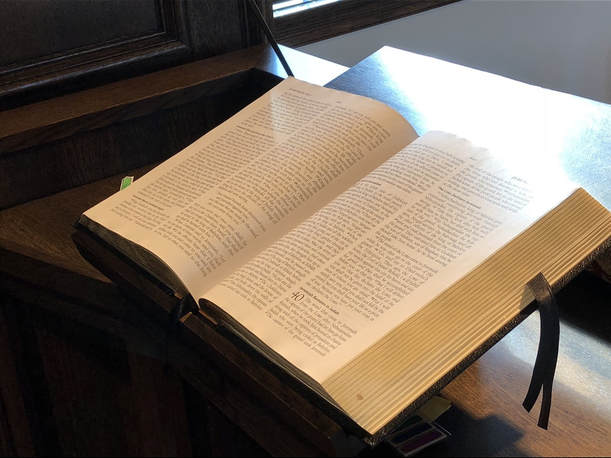|
One of the responses I often get from people who are new to Anglicanism is surprise at the abundance of Scripture that is read in our worship services. Whether it is in the Daily Office, Holy Eucharist, or even weddings or funerals, the public reading of portions of the Bible is central to every act of worship we do. And yet, for many Christians, faith has become overly individualized. The important thing, we are told, is our own personal relationship with Christ. That is all I need. So it should be enough for me to just read the Bible on my own, right? Well, not exactly. While I certainly believe that all Christians need to spend time reading and studying God’s Word privately on a daily basis, it is also vitally important that we read it publicly when we gather together as a community. The history of the public reading of Scripture goes back long before the formation of the Christian Church. When Josiah discovered the Book of the Law in the Temple in 2 Kings 22-23, his first order of business was to have it read in public. The people of God had neglected this practice for so long that they no longer knew what the Lord required of them, and consequently had fallen into idolatry. When Josiah had the book read aloud before the people it sparked a national revival and return to the ways of the Lord. Unfortunately they did not continue with the practice, and quickly fell back into idolatry and ultimately were exiled to Babylon. In Babylon, the Jewish exiles began gathering together on the Sabbath and reading portions of the Law and Prophets as a way to maintain their identity in a foreign land. Often one of the readers would give a short sermon, called a derashah, at the conclusion of the readings. When the Jews returned to Jerusalem and rebuilt the Temple they brought their synagogues with them, and these communities devoted to the reading of Scripture became the focal point of worship for most Jews. The early Christians followed the same pattern of prayer and the public reading of Scripture when they met, adding to it the celebration of the Lord’s Supper.
This same pattern serves as the model for our own Anglican worship today. The lectionary provides us with a three year cycle of set readings for each Sunday which include lessons from the Old Testament, Psalms, Epistles, and Gospels. The lectionary helps us to not only focus on certain seasons and themes throughout the year, it also ensures that we are covering the full breadth of the Biblical narrative and not ignoring parts that we might not always like. While the preacher for the day does not necessarily preach on all of the readings, it is certainly our practice at All Saints to focus on at least one of them for the day’s sermon, and the lectionary often forces the preacher to address difficult passages or subject matter. But even though we are not preaching on all of the readings does not mean it is unimportant to read them. The more Scripture we hear read publicly, the more we will begin to internalize the eternal message of God’s revelation to us. In addition to the weekly Sunday morning lectionary, we have assigned readings for Morning and Evening Prayer. The Daily Office lectionary is a one year cycle that includes two readings at each service (a total of four readings each day) and does a very admirable job of covering the majority of Scripture in a year. We also read through the Psalms each month in Morning and Evening Prayer. So, given that we have the Daily Office Monday through Friday, Women’s Bible Study on Thursday, Men’s Bible Study on Saturday, and Eucharist each Sunday, it is safe to say that the Scriptures are being read publicly every day of the week at All Saints. As we approach the season of Lent, I would like to encourage all of you to take the opportunity to be present for these services as much as possible. Allow yourself to hear God’s Word proclaimed publicly each day. Although the season of Lent is technically a fast, permit yourself to feast on the Word of God and let it nurture you soul.
0 Comments
Leave a Reply. |
The Rev. Eric ZolnerFather Eric is a 3rd generation Anglican and the Rector of All Saints Anglican Church in Springfield, MO. Archives
February 2021
Categories |
|
All Saints Anglican Church
2751 E Galloway Street Springfield, MO 65804 Church Phone Number: 417-888-3001 GET DIRECTIONS |
Sunday Morning Worship
8:15 a.m. Holy Communion 10:45 a.m. Holy Communion Click here for this week's worship schedule Morning Prayer 8:15 a.m. Monday through Friday |


 RSS Feed
RSS Feed